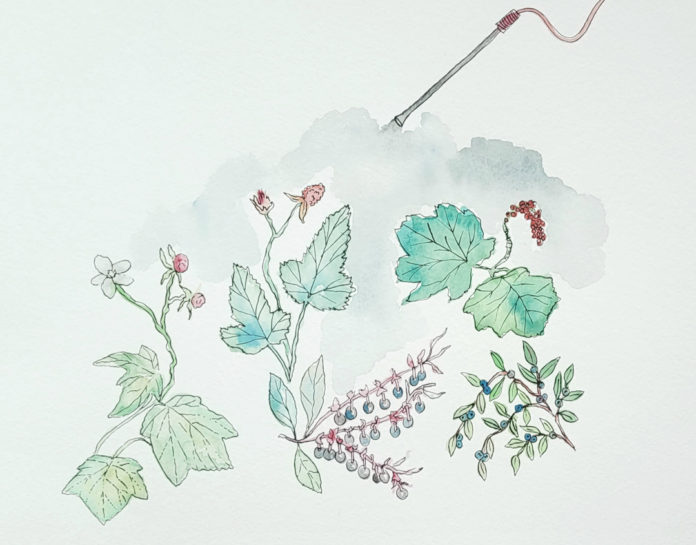In June 2019, professor Rod Cumberland was fired from the Maritime College of Forest Technology after expressing views against the use of the chemical glyphosate on Canadian forests in a department meeting. Prior to the meeting, Cumberland had discussed the issue with his students in lectures. Former director of the forestry college Gerald Redmond, who still worked at the school in a teaching capacity, told the CBC that he believed the real reason for Cumberland’s dismissal was due to his criticism of glyphosate spray. The college fired Redmond the morning after his comments went public. Fast forward to 2022, criticisms and concerns of the glyphosate spray over B.C. forests have risen once again.
The “Integrated Pest Management Plan” by British Columbia Timber Sales (BCTS) indicates a five-year commitment to spray the herbicide via aerial and ground-based delivery over the forested regions between Squamish and Hope. The intention for spraying the herbicide is to clear out “pests” in order to create room for growth of various tree seedlings that will be harvested for timber sales. This large section of forest is the home to the St?:ló, St’át’imc, Nlaka’pamux, Squamish, and Tsleil Waututh First Nations people. For thousands of years, these Nations have lived on the land and traditionally harvested numerous plant species, including (but not limited to) blueberry, thimbleberry, salmonberry, devil’s club, raspberry, and salal.
The spraying of herbicide affects a plant’s ability to produce the necessary proteins needed for growth, thus effectively killing off the targeted (and neighboring) species to clear land needed for timber growth. The effects of the spraying render the land obsolete for harvesting for years after the spraying occurs.
In addition to interfering with the harvesting practices of First Nations people, the killing of these species will remove a major food source for the vast majority of the wildlife that reside in the region. Sprayed areas will furthermore be replaced with commercially-friendly timber seedlings — which dramatically increases the risk of wildfire. Although the BCTS Pest Management Plan claims to recognize the presence of these native species and their vital importance to the First Nations people, the report maintains the inclusion of such plants in the list of species classified as “pests.”
In a recent gathering of legislative assembly, Adam Olsen, MLA of Saanich North and the Islands, asked Minister of Forests Hon. Katrine Conroy, “Does the Minister believe that the rights of Indigenous peoples to harvest traditional plants are outweighed by the ministry’s interests to maximize harvest volumes by the spraying of glyphosate?” The minister responded by stating that the Pest Management Act recognizes the importance of these plants to Indigenous peoples, and that First Nations communities are consulted when making these decisions. The speaker, however, failed to make note of who was consulted and when.
It’s clear to see that the provincial government, with the support of the federal departments, fully intends on steamrolling ahead with the spraying of glyphosate. Consultation with First Nations communities has been minimal, if at all. Academics expressing concerns over the spraying have been fired from their positions in order to maintain healthy relationships with corporate interests.
In April 2022, the government of Canada published a statement renewing its commitment to reconciliation. Since then, the spraying of culturally significant plant species over unceded territory has continued to occur. Decisions are rushed through, voices are suppressed, and big business continues to line the pockets of our leaders. What happened to the government’s commitment to reconciliation?
As children, we’re taught that apologies mean nothing without corrective action. Yet our elected officials continue smiling for the cameras, twiddling their thumbs, and doubling down on the violent oppression of First Nations communities. Not only are they trampling over human rights, but seemingly doing as much damage as they possibly can while completely neglecting the health of the environment.
While the time for public discourse has slowed down, Stop The Spray BC is taking multiple actions to fight against the spraying such as contacting parliamentary representatives and forming petitions to bring this issue further into light and re-open public inquiry. You can find out more about how to get involved and show your support on their website.
Kellyn Kavanagh (they/he) is a local writer, photographer, and musician. They first started writing what they now know to be flash fiction stories in the third grade when they learned how to make little books with a couple sheets of printer paper and a stapler. Their work typically focuses on non-ficiton journalism, short horror fiction, and very depressing poetry.



